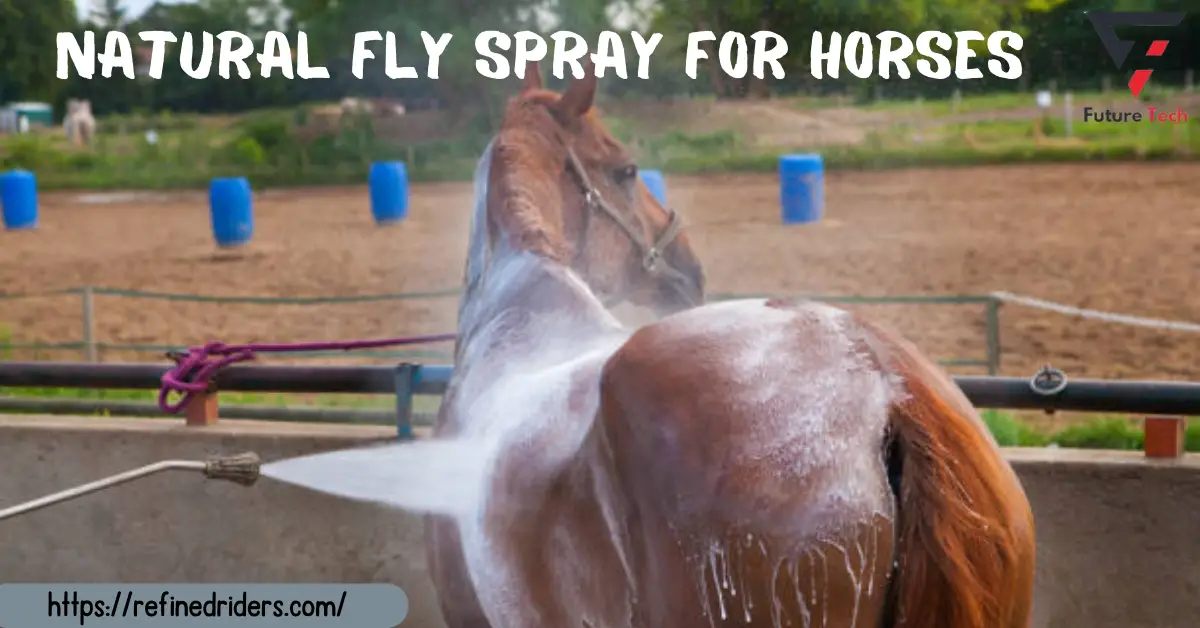For centuries, horses have been a part of labor, sports, and leisure activities. They are not immune to the annoyances of flies and other bothersome insects. These irritating insects can upset our equine companions physically and mentally. Investigating the advantages of making homemade natural fly spray for horses makes sense since we protect the environment and support eco-friendly solutions. This post will explore the best DIY fly sprays for horses, recipes, advantages, and issues with store-bought fly sprays.
Benefits of Homemade Fly Spray for Horses
Cost-Effectiveness and Efficacy
Every dollar matters in equine care, which can be highly costly. Horse fly sprays made at home can be an affordable substitute for products bought from stores. If you source the ingredients and make the spray at home, you can cut costs considerably and guarantee that your horse friends are safe from the flu threat. The secret to making homemade fly sprays work is to mix the ingredients in the right amounts for your area and requirements. Properly chosen components, like vinegar, essential oils, and carrier oils, can be strong insect repellents against flies and other bothersome insects. Appropriately combined, these components can give horses a strong shield without going over budget.
Avoidance of Harsh Chemicals and Toxic Ingredients
For horse owners who put their animals’ health first, one of their main worries is the possible harm that harsh chemicals in commercial fly sprays may cause. Toxic insecticides and repellents in many of these products may adversely affect humans, horses, and other animals. However, making your fly sprays gives you total control over the ingredients. They also provide a non-aggressive yet efficient way to control flies.
Essential oils with natural insect-repelling qualities, such as citronella, lemon eucalyptus, tea tree, cedar, peppermint, and lavender oils, are frequent ingredients in homemade fly sprays. These components work well to keep flies away and reduce the possibility of exposing horses to harmful materials that could cause allergies, skin irritations, or other health problems.
Eco-Friendly Solutions
As environmentally conscious people, we must consider how our actions affect the planet’s ecosystems. Eco-friendly, sustainable, and conservationist principles align with homemade fly sprays. Commercial fly sprays frequently come in plastic bottles, adding to the issue of plastic pollution, which is only getting worse. Homemade different options, on the other hand, let horse owners repurpose containers, cutting down on plastic waste.
Waste reduction is a significant concern in the modern world, and reducing our ecological footprint is essential. Horse fly sprays made at home support this cause by encouraging the reuse of spray bottles. Horse owners can clean and refill empty commercial containers with homemade recipes rather than throwing them away. Reusing bottles lowers the quantity of waste in landfills and lessens the need for new plastic packaging. The principles of environmental responsibility and conservation align with this sustainable practice. Furthermore, most natural fly spray ingredients are biodegradable and don’t leave any harmful environmental residues behind. This environmentally friendly method minimizes the adverse effects on the natural world while guaranteeing the safety of our beloved horses.
What’s the best recipe?
I’m still determining. Many recipes are online; how can you decide which is the best? I am unable to respond to this question. Not even near it. The ease of use and straightforward ingredients of creating your fly spray has always captivated me, but I prefer the convenience of purchasing a bottle of fly spray from my local feed store. That’s where. Yes, I did.
However, I have put together some information regarding ingredients for homemade fly sprays in the interest of education, keeping an open mind, and even being a little more “green.” Hopefully, this will be educational and fun.
Ingredients for Total Horse Protection-Natural Fly Spray:
The first step in creating a homemade fly spray that works is carefully choosing the ingredients. Typical components consist of the following.
Essential Oils
Insects and flies dislike the scents and repellent properties of essential oils. Many oils have natural insect-repelling qualities, including citronella, lemon eucalyptus, lavender, cedar, and peppermint. The best oils are frequently lemon eucalyptus and citronella oils. Their primary function is to dissuade flies and other bothersome insects.
Transport Oils
Often disregarded but vital for some reasons, carrier oils are an essential recipe component. Mineral oil, vegetable oil, and coconut oil are examples of common carrier oils. The healthiest choices are Jojoba, argan, sweet almond, coconut, and other comparable oils. Use coconut oil carefully because it will solidify below 76 degrees Fahrenheit (24 degrees Celsius). These oils act as a foundation upon which the essential oils adhere and aid in their dilution. This allows the solution to evenly adhere to the horse’s coat, forming an effective barrier that helps prevent skin irritation and has a longer-lasting effect.
Vinegar
Apple cider and distilled white vinegar are standard components of homemade fly sprays. They improve sure flies’ and insects’ ability to repel while enhancing the general health of the horse’s skin and coat.
Empty Dish Soap
Occasionally, a tiny bit of liquid dish soap is added to the mixture to aid in the uniform dispersion of the essential oils and enhance the spray’s adherence to the horse’s coat. Additionally, it serves as a repellent since flies that come into contact with it risk dying.
Other Components
Consider using witch hazel or glycerin as additional ingredients. White hazel and glycerin can be gentle carrier oils that are calming. Additionally, people have discovered that other substances like mouthwash, DEET, methylated spirit, flat beer, strong tea, Epsom salt, and permethrin work well as repellents. Please exercise caution when handling some of these, as they may be toxic.
Using Homemade Fly Spray for Horses
You must adhere to a few basic but essential rules to guarantee that your homemade fly spray for horses works as well as possible. Apply after giving it a good shake. Shake your homemade fly spray well before using it. Owing to the thorough mixing, the components are ready for distribution. Remember to avoid delicate areas.
Use extra caution when spraying in delicate areas like your horse’s eyes, ears, and nostrils. Carefully spray around these sensitive areas with a cloth or sponge to preserve them.
First, perform a safety patch test. Make sure to do a patch test on your horse before dousing it in the homemade fly spray. Check for allergic or adverse reactions by applying a small amount to a discrete area of your horse’s skin. Primacy is invariably safety.
The secret is to store things properly. Keep your homemade insect repellent out of direct sunlight and in an excellent, shaded location. This guarantees sustained efficacy and protects the integrity of the essential oils.
If needed, reapply insect repellent. Reapplying homemade fly spray is necessary, just like with commercial sprays. Due to their natural ingredient content, they require more frequent application than commercial fry sprays. It might also be necessary to use it more frequently because of things like high fly activity or wet weather. Reapply as needed, keeping an eye on your horse’s comfort.
Your homemade fly spray will work best if you follow these instructions, protecting your horse from flies and other bothersome insects.
The Best All-Natural DIY Fly Spray for Horses
This fly spray recipe uses natural solid ingredients to effectively repel flies while adhering to an honest and environmentally friendly method. It has shown to be a popular choice among many equestrians.
RECIPE:1
Ingredients:
- four ounces or more Avon Original Skin So Soft Bath Oil
- 5 ounces or more oil of citronella
- 5 ounces or more Lemon oil of eucalyptus
- One and a half cups of pure white vinegar
- one and a half cups water
Guidelines:
1. Fill a 2-liter bottle with all of the ingredients.
2. Verify that the bottle’s seal is tight.
3 Before using, give the ingredients a good shake to make sure they are well combined.
.4. Add more essential oils if you need a stronger repellent potency.
RECIPE:2
This different recipe for natural fly spray combines vinegar, water, and essential oils in a slightly different way to produce an equally potent result.
Ingredients:
6 ounces or more transport oil
Ten ounces or more of Citronella oil, five ounces or more, Two ounces (or more) of lemon eucalyptus oil, Peppermint oil, or lavender oil
Apple cider vinegar in two cups
Two mugs of robust and chilled tea
Guidelines:
1. Fill a 2-liter bottle with the entire mixture.
2. Verify the bottle’s tight closure.
3. give the ingredients a good shake before using to ensure they are all well combined.
4. Add more essential oils if you need a stronger repellent potency.
SUMMARY
Horse fly sprays made at home are safer, more affordable, and environmentally friendly. Rubbing alcohol, essential oils, and carrier oils in the proper proportions can create potent insect repellents without breaking the bank. Homemade fly sprays protect horses’ health by avoiding harsh chemicals and toxic ingredients and limiting their exposure to dangerous substances. They lessen the need for new plastic packaging by encouraging recycling and reducing plastic waste. The ideal homemade fly spray recipe will vary depending on the horse’s requirements and the convenience of buying from a nearby feed store.
You can make DIY fly sprays for horses with vinegar, liquid dish soap, essential oils, and carrier oils. Insect repellents that work well include citronella and lemon eucalyptus essential oils. For dilution and adherence to the horse’s coat, carrier oils such as coconut, vegetable, and mineral oils are necessary. You can add liquid dish soap for its repellent qualities and even dispersion. For calming effects, you can add glycerin or witch hazel. Apply the spray after shaking, and keep it away from sensitive areas for maximum efficacy. Before using, conduct a safety patch test and save the spray in a shaded area. To keep the spray’s effectiveness, reapply as necessary.




